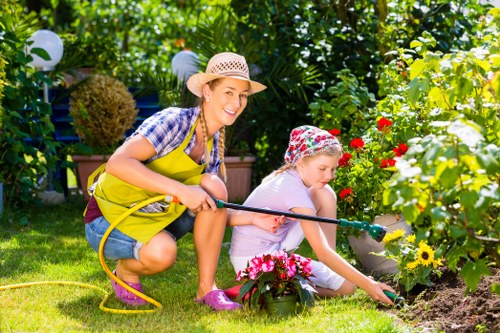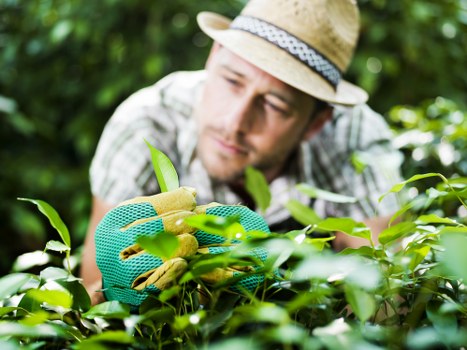Comprehensive Guide to Garden Maintenance in Beverley Park

Maintaining a beautiful garden requires dedication, knowledge, and the right tools. In Beverley Park, homeowners take pride in their green spaces, ensuring they remain lush and vibrant throughout the year. Whether you're a seasoned gardener or a novice, understanding the essentials of garden maintenance can transform your outdoor area into a stunning haven.
Effective garden maintenance in Beverley Park involves a combination of regular upkeep tasks and seasonal care. From pruning and fertilizing to pest control and landscaping, each step plays a crucial role in maintaining the health and aesthetics of your garden.
In this guide, we'll explore the key aspects of garden maintenance specific to the climate and conditions of Beverley Park, providing you with actionable tips to keep your garden thriving.
Essential Garden Maintenance Tasks

Regular maintenance is the backbone of any well-kept garden. Here are the essential tasks you should incorporate into your routine:
- Pruning and Trimming: Keeping plants and shrubs trimmed promotes healthy growth and prevents overgrowth.
- Weeding: Removing weeds regularly ensures that your plants receive adequate nutrients and space.
- Watering: Consistent watering is vital, especially during dry spells, to keep plants hydrated.
- Fertilizing: Providing essential nutrients boosts plant health and stimulates growth.
- Pest Control: Monitoring for pests and addressing infestations promptly protects your garden's integrity.
In addition to these tasks, seasonal activities such as mulching, soil aeration, and planting seasonal flowers can significantly enhance the beauty and health of your garden.
Seasonal Garden Care

Each season presents unique challenges and opportunities for garden maintenance in Beverley Park. Adapting your care routine to the changing weather ensures that your garden remains resilient and beautiful year-round.
Spring Maintenance
Spring is the perfect time to rejuvenate your garden after the winter months. Focus on:
- Cleaning: Remove any debris accumulated over winter and prepare beds for new growth.
- Planting: Introduce spring-flowering plants to add color and vibrancy.
- Soil Improvement: Amend the soil with compost to enrich nutrient levels.
Summer Care
During the summer, prioritize:
- Consistent Watering: Ensure plants receive adequate moisture, especially during heatwaves.
- Mulching: Apply mulch to retain soil moisture and suppress weeds.
- Pest Monitoring: Keep an eye out for pests that thrive in warmer temperatures.
Advanced Maintenance Techniques

For those looking to take their garden maintenance to the next level, consider the following advanced techniques:
- Pruning for Shape and Health: Learn proper pruning techniques to maintain plant shape and encourage healthy growth.
- Companion Planting: Utilize companion planting strategies to enhance plant health and deter pests naturally.
- Irrigation Systems: Invest in automated irrigation systems to ensure consistent watering without manual effort.
- Soil Testing: Regularly test soil pH and nutrient levels to tailor fertilization and amendments effectively.
Implementing these techniques can lead to a more sustainable and efficient garden maintenance routine, saving time and resources while enhancing garden beauty.
Choosing the Right Tools for Garden Maintenance
Essential Tools
Having the right tools is essential for effective garden maintenance. Some must-have tools include:
- Pruners and Shears: For precise pruning and trimming.
- Garden Fork: Ideal for soil aeration and turning.
- Watering Can or Hose: For efficient watering of plants.
- Weeder: To easily remove stubborn weeds.
- Gloves: Protect your hands while working in the garden.
Advanced Equipment
For larger gardens, consider investing in:
- Lawn Mower: Keeps your lawn neat and well-maintained.
- Leaf Blower: Efficiently clears leaves and debris.
- Rototiller: Prepares the soil for planting by breaking it up.
- Compost Bin: Allows for sustainable composting of garden waste.
Choosing the right tools not only makes maintenance easier but also enhances the overall efficiency and enjoyment of your gardening activities.
Local Garden Services in Beverley Park

If maintaining your garden feels overwhelming, consider hiring professional garden maintenance services in Beverley Park. Local experts can provide tailored solutions to meet your garden's specific needs.
Professional services offer a range of options, including regular maintenance schedules, one-time cleanups, landscaping, and specialized treatments for plants. Their expertise ensures that your garden receives the best care, promoting healthy growth and aesthetic appeal.
Contact us today to learn more about how our experienced team can help you achieve the garden of your dreams in Beverley Park.
Nearby Areas to Beverley Park for Garden Maintenance Services
For residents of surrounding neighborhoods, the availability of garden maintenance services extends beyond Beverley Park. Here are some of the closest areas where you can access top-notch gardening support:
- Elmwood: Located just 2 miles from Beverley Park, Elmwood offers lush green spaces perfect for gardening enthusiasts.
- Maple Grove: Known for its spacious yards, Maple Grove is a prime area for professional garden services.
- Sunnydale: With a climate similar to Beverley Park, Sunnydale benefits from the same gardening care tips.
- Riverside: The proximity to the river provides unique gardening opportunities and challenges.
- Greenfield: Famous for its community gardens, Greenfield is ideal for collaborative gardening projects.
- Lakeside: Offers beautiful waterfront gardens that require specialized maintenance.
- Hillview: The hilly terrain of Hillview demands expert landscaping and garden care.
- Oakridge: Oakridge's mature trees and established gardens make it a sought-after area for maintenance services.
- Brookside: With its scenic brooks, Brookside gardens often feature water plants that need specific care.
- Pinecrest: Pinecrest's pine trees and coniferous plants require dedicated maintenance strategies.
Each of these areas has its unique features, making local garden maintenance services adaptable and knowledgeable about the specific needs of each neighborhood.
Book your service now to ensure your garden in Beverley Park or nearby areas receives the attention it deserves.
Benefits of Regular Garden Maintenance
Consistent garden maintenance offers numerous advantages, enhancing both the beauty and functionality of your outdoor space.
- Healthier Plants: Regular care ensures plants receive the necessary nutrients and protection against pests.
- Enhanced Curb Appeal: A well-maintained garden improves the overall appearance of your home.
- Increased Property Value: Beautiful gardens can significantly boost the value of your property.
- Environmental Benefits: Healthy gardens contribute to cleaner air and provide habitats for local wildlife.
- Personal Well-being: Gardening can be a therapeutic activity, promoting relaxation and mental health.
By prioritizing garden maintenance, you're not only investing in your property's aesthetics but also contributing to a healthier and more enjoyable living environment.
Eco-Friendly Garden Maintenance Practices
Embracing eco-friendly practices in your garden maintenance routine can benefit the environment and promote sustainable living.
- Composting: Recycle organic waste to create nutrient-rich compost for your plants.
- Rainwater Harvesting: Collect and use rainwater for irrigation, reducing water consumption.
- Natural Pest Control: Utilize beneficial insects and organic treatments to manage pests without harming the ecosystem.
- Native Plants: Incorporate native species that are well-adapted to the local climate and soil conditions.
- Mulching: Apply natural mulch to retain soil moisture and reduce the need for frequent watering.
Implementing these sustainable practices ensures your garden remains beautiful while minimizing its environmental footprint.
DIY Garden Maintenance Tips
If you prefer a hands-on approach, here are some DIY garden maintenance tips to keep your Beverley Park garden in top shape:
Creating a Maintenance Schedule
Organize your tasks by creating a seasonal maintenance schedule. This helps ensure that no essential task is overlooked and that maintenance is evenly distributed throughout the year.
Proper Tool Care
Maintain your garden tools to extend their lifespan and ensure they function effectively. Clean and store tools after each use, and regularly inspect for any necessary repairs.
Soil Health Management
Healthy soil is the foundation of a thriving garden. Regularly test and amend your soil to maintain optimal pH levels and nutrient content.
Start your DIY garden maintenance today with these practical tips to enjoy a flourishing garden in Beverley Park.
Landscaping Ideas for Beverley Park Gardens
Enhancing your garden with creative landscaping ideas can elevate its beauty and functionality. Consider the following:
- Patio Spaces: Create outdoor living areas for relaxation and entertainment.
- Flower Beds: Design colorful and diverse flower beds to add vibrancy throughout the seasons.
- Water Features: Incorporate ponds, fountains, or waterfalls for a soothing ambiance.
- Paths and Walkways: Install stone or gravel paths to guide visitors through your garden.
- Outdoor Lighting: Use lighting to highlight garden features and extend usability into the evening.
These landscaping elements not only enhance the visual appeal of your garden but also provide practical benefits, making your outdoor space more enjoyable.
Common Garden Pests and Solutions
Pests can pose significant challenges to maintaining a healthy garden. Identifying and addressing them promptly is crucial.
- Aphids: These small insects can damage plants by sucking sap. Introduce natural predators like ladybugs or use organic insecticidal soap.
- Slugs and Snails: They feed on plant leaves and stems. Use barriers, traps, or natural repellents to control their population.
- Spider Mites: These tiny pests cause discoloration and damage to leaves. Regularly spray plants with water to deter them.
- Japanese Beetles: These large beetles can defoliate plants. Handpick them or use neem oil treatments.
- Caterpillars: They chew through leaves and fruit. Encourage natural predators or apply biological controls.
Implementing integrated pest management strategies helps maintain a balanced ecosystem in your garden, reducing the need for chemical interventions.
Soil Preparation and Improvement
The quality of your soil directly affects the health of your garden. Proper soil preparation and improvement techniques are essential for robust plant growth.
Testing Soil pH
Conduct a soil pH test to determine its acidity or alkalinity. Most plants prefer a pH between 6.0 and 7.0. Amend soil accordingly with lime to raise pH or sulfur to lower it.
Adding Organic Matter
Incorporate compost, manure, or peat moss to enhance soil structure, improve drainage, and increase nutrient content.
Aeration
Regularly aerate your soil to prevent compaction, allowing roots to access oxygen and nutrients more effectively.
By taking care of your soil, you lay a strong foundation for a thriving garden.
Mulching Strategies
Mulching is a simple yet effective garden maintenance practice that offers multiple benefits.
- Moisture Retention: Mulch helps retain soil moisture, reducing the need for frequent watering.
- Weed Suppression: A layer of mulch inhibits weed growth by blocking sunlight.
- Soil Temperature Regulation: Mulch insulates the soil, keeping it cooler in summer and warmer in winter.
- Soil Improvement: Organic mulches break down over time, enriching the soil with nutrients.
Apply a 2-3 inch layer of mulch around your plants, ensuring it's not piled against plant stems to prevent rot.
Pruning Techniques for Healthy Growth
Proper pruning ensures that your plants maintain their shape, promote healthy growth, and increase productivity.
When to Prune
Different plants require pruning at specific times. Generally, late winter or early spring before new growth begins is ideal for most shrubs and trees.
How to Prune
- Identify Dead or Diseased Branches: Remove any branches that show signs of damage or disease.
- Shape the Plant: Trim branches to maintain the desired shape and size.
- Encourage Airflow: Thin out dense areas to improve air circulation, reducing the risk of fungal diseases.
- Cut at the Right Angle: Make clean cuts at a 45-degree angle to promote healing.
Regular pruning not only enhances the appearance of your garden but also supports the overall health and longevity of your plants.
Fertilizing Your Garden Plants
Fertilizing provides essential nutrients that plants need to grow strong and healthy.
Types of Fertilizers
- Organic Fertilizers: Made from natural sources like compost, manure, and bone meal, they improve soil structure and promote beneficial microorganisms.
- Inorganic Fertilizers: Manufactured chemically, they provide quick nutrient availability but may not improve soil health long-term.
- Slow-Release Fertilizers: Release nutrients gradually, reducing the risk of nutrient runoff and plant burn.
Application Tips
- Follow Recommended Rates: Over-fertilizing can harm plants, so adhere to the guidelines provided.
- Apply at the Right Time: Fertilize during the growing season when plants can effectively absorb nutrients.
- Even Distribution: Ensure fertilizers are evenly spread to prevent nutrient imbalances.
By choosing the appropriate fertilizer and applying it correctly, you can significantly enhance the vitality and beauty of your garden.
Watering Best Practices
Proper watering is fundamental to plant health. Here are some best practices for effective watering in your Beverley Park garden:
- Check Soil Moisture: Before watering, assess the soil's moisture level to avoid overwatering.
- Water in the Early Morning: This allows plants to absorb moisture before the heat of the day and reduces evaporation.
- Deep Watering: Water deeply to encourage strong root growth rather than shallow, frequent watering.
- Use Drip Irrigation: Drip systems deliver water directly to the plant roots, minimizing waste and reducing weed growth.
- Collect Rainwater: Utilize rain barrels to capture and reuse rainwater for your garden.
Implementing these watering strategies ensures your plants receive adequate hydration while conserving water resources.
Dealing with Garden Weeds
Weeds compete with your plants for nutrients, water, and sunlight. Effective weed management is crucial for a healthy garden.
Preventative Measures
- Mulching: As mentioned earlier, mulching suppresses weed growth by blocking light.
- Landscape Fabric: Installing fabric under mulch can further prevent weeds from emerging.
- Dense Planting: Planting densely can reduce the space available for weeds to establish.
Removal Techniques
- Hand Weeding: Regularly remove weeds by hand, ensuring you get the roots to prevent regrowth.
- Hoeing: Use a hoe to cut weeds off at the soil level.
- Boiling Water: Pouring boiling water on weeds can kill them without harming your plants.
Consistent weed control measures help maintain the health and appearance of your garden.
Integrating Hardscaping Elements
Hardscaping complements your garden's soft elements, adding structure and functionality.
- Patios and Decks: Provide spaces for outdoor seating and entertainment.
- Walkways: Guide visitors through your garden while preventing soil compaction.
- Fencing: Define garden boundaries and enhance privacy.
- Garden Structures: Incorporate pergolas, arbors, or trellises to support climbing plants and add visual interest.
- Outdoor Lighting: Illuminate pathways and highlight garden features for nighttime appeal.
Thoughtfully integrating hardscaping elements can elevate your garden's design and usability.
Improving Garden Biodiversity
A diverse garden supports a healthy ecosystem, attracting beneficial insects and wildlife.
- Plant Variety: Incorporate a mix of native and ornamental plants to provide habitats for different species.
- Attract Pollinators: Plant flowers that attract bees, butterflies, and other pollinators essential for plant reproduction.
- Provide Shelter: Install birdhouses, bat boxes, or insect hotels to offer shelter for wildlife.
- Water Sources: Add birdbaths or small ponds to supply water for animals.
- Pest Control: Encourage predators like ladybugs and lacewings to naturally manage pest populations.
Enhancing biodiversity not only benefits your garden's health but also contributes to the broader environmental balance.
Garden Maintenance Safety Tips
Ensuring safety while maintaining your garden is paramount to prevent accidents and injuries.
- Wear Protective Gear: Use gloves, goggles, and appropriate footwear to protect against thorns, sharp tools, and debris.
- Tool Maintenance: Keep tools sharp and in good condition to reduce the risk of slippage or breakage.
- Proper Lifting Techniques: Lift heavy objects correctly to avoid back strains.
- Sun Protection: Wear hats, sunglasses, and apply sunscreen to protect against sunburn.
- Stay Hydrated: Drink plenty of water, especially during hot weather, to prevent dehydration.
Adhering to these safety practices ensures that garden maintenance remains a pleasant and injury-free activity.
Conclusion
Effective garden maintenance in Beverley Park combines regular upkeep, seasonal care, and sustainable practices to create a thriving and beautiful outdoor space. Whether you choose to maintain your garden yourself or enlist professional services, understanding the key aspects of garden care is essential.
By implementing the tips and strategies outlined in this guide, you can ensure that your garden remains a source of pride and enjoyment for years to come.
Contact us today to start your journey towards a healthier and more vibrant garden in Beverley Park!
